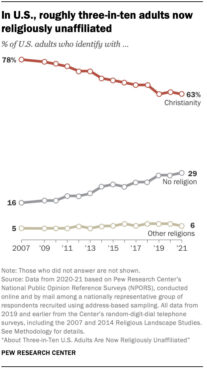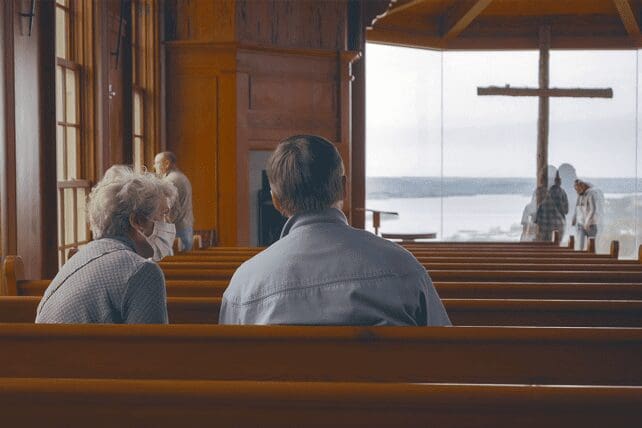(RNS) — Christmas is just 10 days away, and most Americans will celebrate the birth of Jesus. But a new poll from Pew shows the share of U.S. adults who consider themselves Christian is falling.
Only 63% of Americans self-identify as Christian this year, a marked drop from 75% 10 years ago.
The declining number of Americans who say they are Christian is offset by a growing number of people who call themselves atheist, agnostic or people of no particular faith. These unaffiliated Americans make up a full 29% of the U.S. population, up from 19% in 2011.
“The secularizing shifts evident in American society so far in the 21st century show no signs of slowing,” the Pew researchers concluded. “The religiously unaffiliated share of the public is 6 percentage points higher than it was five years ago and 10 points higher than a decade ago.”

“In U.S., roughly three-in-ten adults now religiously unaffiliated” Graphic courtesy of Pew Research Center
Though Christians are still a healthy majority, their decline is perhaps best reflected in two questions from the poll: how often people pray and how important religion is in their lives. Only 45% of U.S. adults said they pray on a daily basis (down from 58% in a similar 2007 survey). And the number of Americans who say religion is “very important” in their lives is also falling: 41% of Americans consider religion “very important” in their lives, down from 56% in 2007.
Protestants account for most of the decline — down 4 percentage points from five years ago and 10 percentage points since a decade ago, with both evangelical and nonevangelical Protestants declining overall to 40% of U.S. adults. Catholics held relatively steady at 21%.
“This is at least in part a reaction to the political environment,” said David Campbell, professor of American democracy at the University of Notre Dame who has written about American secularization. “Many people turning away from religion do so because they think of religion as an expression of political conservatism, or as a wing of the Republican Party. That’s especially true of white Americans. The more religion is wrapped up in a political view, the more people who don’t share that political view say, ‘That’s not for me.’”
There was no corresponding rise in the number of Americans adhering to other faiths. A total of 6% of Americans identify with non-Christian faiths, including 1% who describe themselves as Jewish, 1% Muslim, 1% Buddhist, 1% who are Hindu and 2% who identify with a wide variety of other faiths.
But notably, the number of atheists and agnostics in the survey roughly doubled in the past decade to 4% and 5% respectively, up from 2% and 3% in 2011.
Some scholars said this doubling may not be as big a shift numerically as it is culturally.
“There’s less stigma attached to being an atheist,” said Ryan Burge, assistant professor of political science at Eastern Illinois University and the author of a book about the “nones,” or the religiously unaffiliated. “It’s revealing of what’s been there for a long time, rather than a big shift. People may not have answered honestly 20, 30 years ago.”

